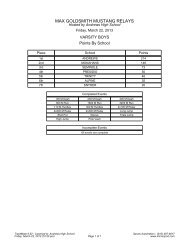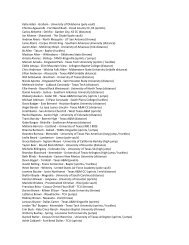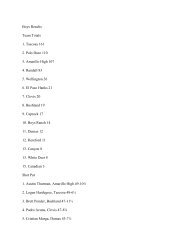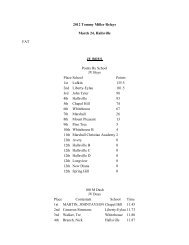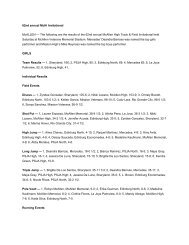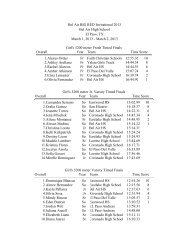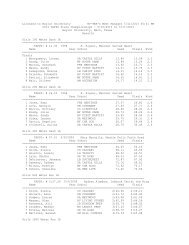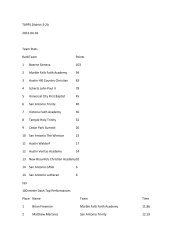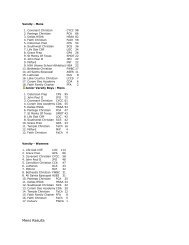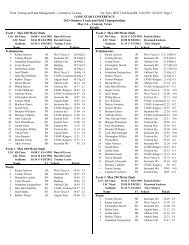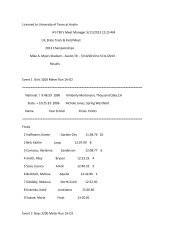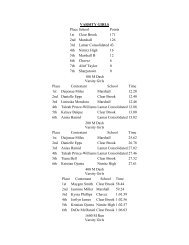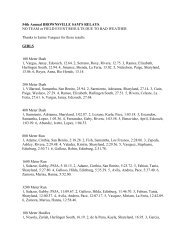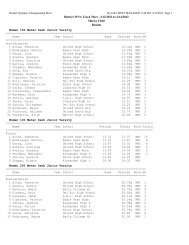1. PAGES 1-35 - Texas Track & Field Coaches Association
1. PAGES 1-35 - Texas Track & Field Coaches Association
1. PAGES 1-35 - Texas Track & Field Coaches Association
You also want an ePaper? Increase the reach of your titles
YUMPU automatically turns print PDFs into web optimized ePapers that Google loves.
occurs most often in the areas of concentration and composure<br />
(Reardon & Gordin, 1999).<br />
The application of psychological skills to competitive<br />
situations requires developing an effective pre-competition<br />
routine, a sound pre-performance routine and a<br />
sound recovery/refocusing routine for use in competition<br />
(Reardon, 1992). All of these routines need to be developed,<br />
utilized and applied in a practice situation in order<br />
to be able to effectively implement them in a competitive<br />
situation (Judge et al., 2010). Elements of a competition<br />
day mental plan include:<br />
Energy Management Skills<br />
Checklist For Competition Day<br />
Mental Plan Chronology<br />
The principle of specificity is very important to keep in<br />
mind when designing physical training programs and is<br />
equally important in the development of psychological<br />
skills. A pre-competition routine for a hammer thrower<br />
may include a planned warm up, positive self-talk, a focus<br />
on performance goals, a relaxation strategy, controlling the<br />
type and amount of interaction with others, a nap earlier<br />
in the day, and monitoring fluid and food intake. The competition<br />
day mental plan in Table 2 was utilized by<br />
American record holder (in the women’s hammer throw)<br />
Erin Gilreath. Ultimately, athletes need to experiment with<br />
the pre-competition routine in practice with the guidance<br />
of the coach.<br />
CONCLUSION<br />
The concept of self-talk has several important implications<br />
for athletes and coaches. Dedicated and driven<br />
coaches seeking success must know how to incorporate<br />
not only the physical aspect of training, but also the mental<br />
aspects as well. Sport psychology has emerged as the<br />
latest tool for helping coaches prepare athletes for competition,<br />
but few coaches take full advantage of psychological<br />
skill preparation. Psychological training for any athletic<br />
undertaking is a complex process that involves learning,<br />
practicing, and applying numerous psychological skills<br />
(like the previously mentioned skill of self-talk).<br />
Psychological training must be part of the periodized plan<br />
and must be programmed as such.<br />
Although this article has focused specifically upon selftalk<br />
for the throwing events in track and field, the basic<br />
psychological concepts and practices noted have application<br />
in numerous other individual and team sports. One of<br />
the most important skills for learning to deal with stressful<br />
situations is to identify self-talk the internal dialogue<br />
occurring within the mind. The “stress-log,” covering the<br />
A’s, B’s, and C’s of the situation, is a useful tool to help<br />
uncover the negative or unhelpful aspects of thinking.<br />
Replacing those negative thoughts with more reasonable<br />
and helpful thoughts is key to optimal results.<br />
All events in track and field and other sports can benefit<br />
from the development of a psychological training plan<br />
that is sequenced and that unfolds in harmony with the<br />
physical training plan. The gap between the science used<br />
to develop the training program on paper and the art of<br />
implementing the program to maximize the performance<br />
in the competitive and practice venues separates good<br />
coaches from great coaches. All coaches strive for the ability<br />
to have their athletes perform in an uninhibited,<br />
relaxed, and skillful manner. Various personalities, team<br />
chemistries, motivations, and attitudes coalesce to create<br />
a series of variables for the coach to juggle. With the daily<br />
practice plan in hand, the coach steps out onto the field<br />
and begins practice where a multitude of unexpected variables<br />
can occur. Implementing and successfully executing<br />
the plan may very well be the biggest challenge. It does not<br />
matter what is on paper if the coach cannot execute the<br />
plan effectively. Understanding each individual athlete<br />
and knowing what motivates him or her is the crucial element<br />
of understanding self-talk and creating an environment<br />
for great performance. Inadequate mental preparation<br />
can easily undermine an excellent physical technical<br />
preparation. Flow, which many experts in the field call<br />
“being in the zone,” is a primary goal of athletes and<br />
coaches alike. A coach who utilizes a plan to train the<br />
mental skills along with the physical skills throughout the<br />
year will minimize the unknown variables and better prepare<br />
their athlete’s ability to perform in competitions.<br />
Developing a strategy for mental preparation will help<br />
your individual athletes and/or team realize their full<br />
potential and enjoy the post event celebration on the<br />
awards stand. The hard work pays off!<br />
Dr. Larry Judge is an Associate Professor of Physical<br />
Education at Ball State University and the Throws Chair for<br />
the USATF Coaching Education Program.<br />
Erin Gilreath was a 2004 Olympian in the Hammer Throw<br />
and competed in two World Championships.<br />
REFERENCES<br />
Alaranta, A., Alaranta, H., Holmila, J., Palmu, P., Pietilä,<br />
K., & Helenius, I. (2006). Self -reported attitudes of elite<br />
athletes towards doping: Differences between type of<br />
sport. International Journal of Sports Medicine, 27(10),<br />
842-846.<br />
Cannon, N. (n.d). The psychology of hammer throwing:<br />
Jud Logan. Retrieved from:<br />
http://hammerthrow.org/training-resources/articles/psychology-jud-logan/<br />
Chroni, S., Perkos, S., & Theodorakis, Y. (2007). Function<br />
and preferences of motivational and instructional self-talk<br />
for adolescent basketball players. Athletic Insight, 9(1).<br />
Csikszentmihalyi, M. (1990). Flow: The psychology of<br />
optimal experience. New York City, NY: Harper & Row.<br />
Ellis, A. (1962). Reason and emotion in psychotherapy.<br />
Secaucus, NJ: Citadel Press.<br />
Feltz, D. L., & Landers, D. M. (1983). The effects of mental<br />
practice on motor skill learning and performance: A<br />
meta-analysis. Journal of Sport Psychology, 5, 25-27.<br />
Gauron, E. F. (1984). Mental training for peak performance.<br />
Lansing, NY: Sport Science International.<br />
Gill, D. L. (2000). Psychological dynamics of sport and<br />
exercise. Champaign, IL: Human Kinetics.<br />
Hardy, J., Grammage, K., & Hall, C. (2001). A descriptive<br />
study of athlete self-talk. The Sport Psychologist, 15, 306-<br />
318.<br />
AUGUST 2011 techniques 33



